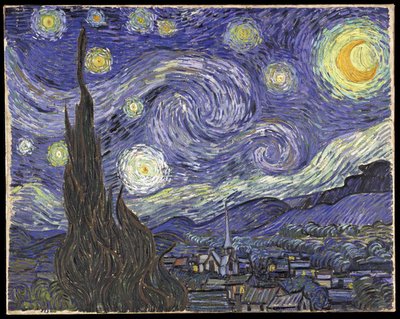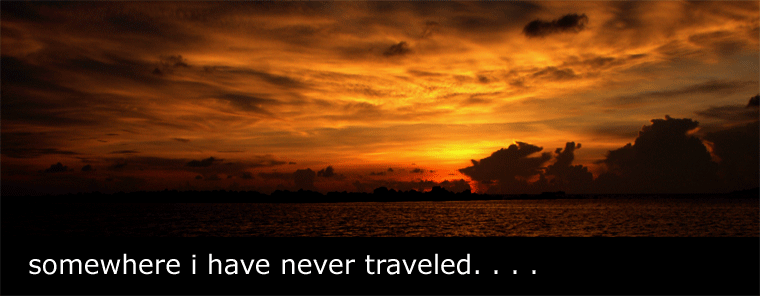Starry, Starry Night
Now I think I know
What you tried to say to me
And how you suffered for your sanity
And how you tried to set them free
They would not listen
They're not listening still
Perhaps they never will
from Starry, Starry Night by Don McLean
He sat on the bench beneath a darkening dusk sky, at a place so familiar to him once upon a time. The sounds of the day were slowly fading, absorbed by the nocturnal noises of muffled footsteps and closing doors. The bells of the nearby church tolled the time, and he knew that soon, he too had to leave. But the melancholy evening crept up like a hidden hand behind the rushing darkness. He had no choice but to yield.
He was alone then, naturally, coming from a long day of useless worry and still more useless work. He felt utterly defeated, beat up, wasted, feeling as though breathing itself were a stupendous effort, feeling as though his life would unravel at the slightest beating of his heart.
Then the voices came again, stern and certain, like a drum beat rising in his ears:
"Your life is a joke."
"You were just a waste of my time."
The words fell like a hammer to the anvil: crashing, loud, heavy. And yet he could not speak, he could not say a word, because he knew all of it was true, he wanted to believe it was true, if only to let her stay.
* * *
The rage with which he tried to take Paul's life drove him too to take the razor to himself, slicing off his ear in a sign of repentance and frustration. He knew that he was losing his mind. Seeking for an unrealized cure, he turned to the Monastery of Saint-Paul de Mausole, in the southern city of Saint Rémy de Provence, a few kilometers from the Mediterranean Sea.
He had found some stability in his life there in Saint-Paul, admitting himself into the asylum, and converting an adjacent cell into a studio. He did not have much to do during the day, and thus devoted himself entirely to his painting, the source of his greatest passion and his greatest folly. Later, he was allowed to venture further afield, taking easel and oils into the French countryside, painting wheat fields, olive groves, cypress trees.
And the sunflowers, oh, the sunflowers, they were everywhere, its yellow contrasted only by the yellow of the sun itself.
He knew, of course, that his mind teetered on the brink of oblivion. And so, with the purposeful fervor of a man without time, he poured his soul into his passion, uncertain whether the exercise itself was what kept the demons at bay, or whether it was these demons which provided him his elusive inspiration. The oblation, in any event, was absolute: he was risking his life for it, and his reason had half-foundered. Executing painting after painting, the darkness of his mind only fuelled the brightness of his colors.
The episodes, of course, were getting graver and more frequent. Only recently, he had tried to kill himself by swallowing a bottle of paint. It was poetic, he thought: the medium of his life would also be the instrument of his death. Naturally, the doctors would have none of it. They confiscated his brushes and his paints, leaving him with only charcoal and paper. He had to make due with black and white scribbles.
But the colors within him could not be suppressed; the dark demons that spoke words and mocked him needed to find form. And so he demanded to be let out, released, set lose into the country side that he loved. And in the midst of that dementia, in the play of light and shadow in which moved his mind and his soul, he executed his most evocative works yet, one after another, until he knew that he was almost entirely spent.
It was on one of those dark evenings when he felt the demons come. It started with a shaking of the hand, a dimming of the sight. And then the voices would whisper, all around him, echoing through his spartan quarters, reverberating in his mind.
“Vincent,” they said. “Vincent!” persistent and macabre.
He clutched his head, almost as a reflex, leaning upon his easel. No, I will not listen, he told himself. I will not go. And with supreme effort, he fought them, he fought the voices, now, closing in upon him. He had nowhere else to go. He unlatched the door, and ran out into the darkness, his robe fluttering in the chill of that pregnant night, out of the asylum, into the garden, out onto the sunflower fields, grey now from the moon. The gentleness of the provençal evening was shattered by his clumsy footfalls, scrapping the well-worn path which led into the city, all the while wailing his protests against the voices that did not leave.
“Please leave me alone,” he shouted. “I have nothing to give you!”
“I know you have nothing to give us,” a voice answered.
“Certainly, you have nothing to give us,” another followed.
“You do not have anything to give us,” echoed a third.
“Please, what do you want of me?” he screamed, loosing his footing on the rocky soil. He fell and struggled to get up. But he was too exhausted. He lay panting on the ground.
“Such a waste, Vincent, it was all such a waste!” the voice intoned.
“No, no,” he said, persistently, defiantly, yet with hardly any breath left in him. “You are wrong! You are all wrong!” he said, almost in a whisper. “I have not wasted anything!” He was breathing hard now, his mind close to breaking.
Then suddenly, the voices vanished, fading into the wind like exorcised spirits.
He closed his eyes for an instant, and savored the moment of release. He opened them to the sight of the city far into the horizon, fast asleep. In the shadows, he could make out the shape of the church steeple, following with his eyes its pointed spire, and tracing its outline to the heavens. Slowly, he tilted his head upwards, and almost immediately, the glorious sky above him exploded in a display of orange and yellow. He looked without blinking, amazed at all its splendor, as though the heavens had broken open and given up its treasures of amber and diamond. In his mind’s eye, he saw the darkness move in a swirl of energy, the stars pulsating against a velvet that was restful yet alive.
In that moment of epiphany, he clumsily struggled to his feet and rushed back to his cell, fuelled, it seemed, by the very stars themselves. He flung away an unfinished canvas, and in the fervor of that lucid insanity, described from memory what he saw in his mind. With deft brush strokes and deliberate lines, he traced onto the canvas the indignation and indifference of his unseeing world, pouring his pain and loneliness and insecurity in one magnificent instant, so that his soul, from off the canvass, seemed to take flight, escaping to the heavens, in that most fantastic of starry nights.

* * *
As he walked from the bench toward his car, he told himself that it was summer once again, the sky still bright even after the setting of the sun. Already, he saw the first hints of starlight filter through the dirty darkness, as the nighttime fought with day, and he wondered how many people, at that precise moment, were looking heavenwards also, like he was.
How little we are understood, he thought, and then, he continued walking.
Suddenly, he began to hear another voice, much fainter, although more familiar, because it was his own.
In the secret corners of his mind, he knew that this was an inevitable conversation, one which spoke an unspeakable truth which he had kept in his heart, one which he himself did not want to hear spoken. But the voice, as persistent as the filtering starlight, needed to find expression. He therefore silenced himself with the resolve to listen, tenuous and feeble though that resolve, at that time, may have been. So that, as he reached his car parked at the other side of the road, he heard no other sound, at last, except the chiming of the bells.





"how little we are understood"
beautiful! brought tears to my eyes.
Posted by Anonymous |
4:09 AM
Anonymous |
4:09 AM